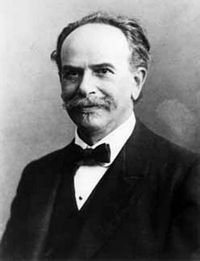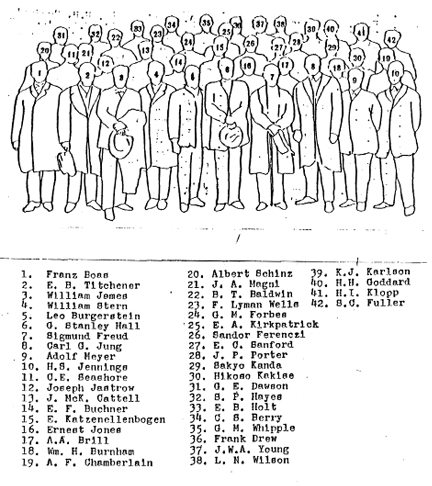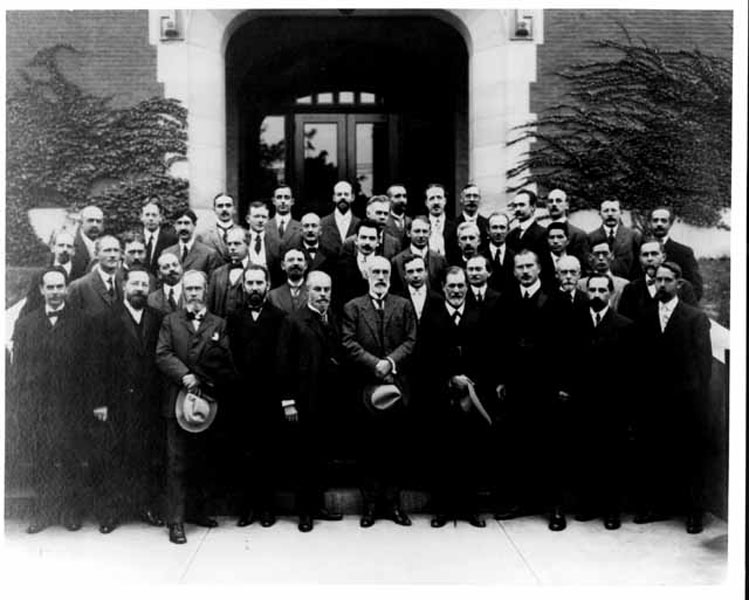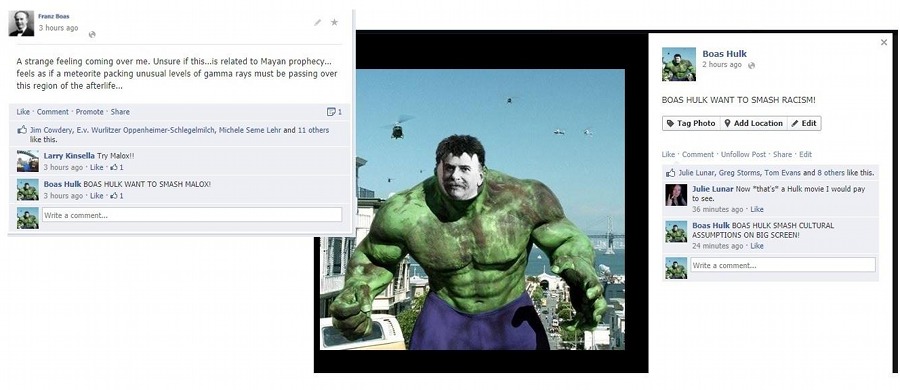The Afterlife Ethnographic Survey
« previous post | next post »
 Franz Boas has a facebook page, whose contents suggest that his acumen is undimmed by death. A couple of weeks ago, one of his facebook friends asked this:
Franz Boas has a facebook page, whose contents suggest that his acumen is undimmed by death. A couple of weeks ago, one of his facebook friends asked this:
When Freud gave his famous "introductory lectures" at Clark University in 1909, Boas was a faculty member at the same university. I wonder if he attended the lectures? I have read some off-hand comments in Franz Boas's writing indicating that apparently he didn't think much of Freud. But does anyone know of any more in-depth historical accounts of this (missed?) encounter between papa Freud and papa Boas? Thank you hive mind!!!
Boas responded:
When I read Totems and Taboos I thought it was one of the most brilliant parodies ever written. You can imagine my surprise when I learned that Sigmund was serious about all that elders urinating on the fire nonsense. Such flights of fancy, imposing Victorianism on the human subconscious as a human universal. He has not fared well here in the afterlife, last time I saw him he was living in a van down by the river with L. Ron Hubbard.
Apparently there's a bit of a housing shortage in the afterlife, because Boas has this to say about Jason Richwine's guest post at Think Progress:
So little has changed at Harvard since my time, but I understand that at least the campus' coffee has improved there. Not long ago, here in the afterlife, I ran into Madison Grant and Charles Davenport, they were living in a van down by the River Styx drinking sterno and using a giant Etch A Sketch to draw intricate diagrams ranking the human races. Apparently this was their version of heaven. Some people never learn.
But it seems that the employment outlook there is improving:
Bad news for those of you still alive and teaching: the Gates Foundation has just negotiated online teaching contracts here in the afterlife as part of Gate's Old School Social Science Classics Network. Sapir and I will be co-teaching Field Linguistics next term using Gates' new Ectoplasm MOOC Series (EMS) . We have nothing but time and work for peanuts, so you can soon expect pink slips, but once you are dead you'll find plenty of employment opportunities.
Anyhow, to answer the original question about Freud's lectures at Clark University in 1909, it seems almost certain that Boas was in the audience. This page from the centennial celebration describes the context:
To observe the twentieth anniversary of the University's founding as the second graduate school in the United States, President G. Stanley Hall scheduled a series of conferences in July and September 1909. Hall intended the conferences to reflect the University's major areas of study. The five-day July event was a national conference on child welfare that brought together a variety of speakers representing the range of child welfare issues. In the fall, two weeks of conferences were held in other fields that were strengths at Clark from the beginning: psychology and pedagogy (education), physics, chemistry, mathematics, biology and history/international relations (a conference on China and the Far East).
Each conference covered a range of topics, including many ground-breaking ideas. Sessions were also held throughout the September conferences that promoted the best methods of teaching for each discipline. Conference speakers came from Clark's faculty, from across the United States, and from abroad, and they were leaders and pioneers in their fields. Sigmund Freud was the speaker who would perhaps be best known today.
Honorary degrees were given to 21 of the guest lecturers, including Freud (the only such academic honor he ever received), Carl Jung (at age 34, Clark's youngest honorary degree recipient to date), pioneering anthropologist Franz Boas, and physicists Ernest Rutherford and Albert A. Michelson.
Russell Jacoby ("When Freud Came to America", Chronicle of Higher Education 9/21/2009) notes an interesting aspect of the event:
Freud spoke off the cuff from notes to a good crowd. Yet contemporary observers of the Clark lectures did not mention what today would be extraordinary. Freud spoke in German with no translation provided. Today if Jürgen Habermas lectured in German at an American university, the audience could comfortably sit around a small table. But a century ago, a series of lectures in German neither diminished the audience nor elicited disapproval.
And Richard Shweder, "Freud's Friends and Enemies", Psychology Today 2/2/2010, reproduces a photograph of (some of?) the audience at Freud's lecture:
The accompanying key indicates that Freud is in the center of the picture, while Boas is at the far left of the front row:

A version of Freud's lectures was published in 1910 as Über Psychoanalyse, with an English translation available here. Freud attempts to persuade his audience that "psychoanalytic investigations trace back the symptoms of disease with really surprising regularity to impressions from the sexual life". Boas's lecture was published in 1910 as "Psychological problems in anthropology", The American Journal of Psychology, 21(3), 371-384. Boas does not mention either neurosis or sexuality, but rather deals with "the mental equipment of the various races of man" and with "the psychological laws which govern man as an individual member of society".
Back on the Boas facebook page, a strange series of episodes is documented in December of 2012:
But I was disappointed to learn so little about the reactions of Prof. Boas (or Boas Hulk) to (post-) modern trends in the discipline that he helped to found.


D-AW said,
May 27, 2013 @ 9:11 am
I wonder how broadly recognized the reference to "living in a van down by the River [Styx]" is? Has Matt Foley travelled far beyond those of us who were in our mid teen to late teens in the mid nineties?
[(myl) One reason that the Foley sketches were so effective is that "living in a van down by the river" is about as close to a pan-cultural signifier as it's possible to get.]
GeorgeW said,
May 27, 2013 @ 3:10 pm
I think I like the idea of someone creating a FB account for a deceased person and keeping their ideas up to date. On the other hand, . . .
J.W. Brewer said,
May 28, 2013 @ 12:43 pm
Lecturing in German in the specific place and time doesn't strike me as any odder than, say, lecturing in Latin at any decent German university in the 18th century or earlier would have been (or, for that matter, lecturing in English at a university in a not-officially-Anglophone part of Europe would be these days). Obviously, fashions change.
I would imagine that a quite substantial percentage of the small number of U.S. university faculty circa 1909 whom we would in hindsight call linguistics scholars had done graduate work in German universities, and virtually all of the rest were able to read scholarly works in German.
spherical said,
May 29, 2013 @ 6:03 am
I guess German has seen better times as an academic language. These days, students at German universities tend to submit even undergrad papers in English (in pursuit of international relevance I guess), often to the detriment of their clarity of expression.
Joe Fineman said,
May 29, 2013 @ 12:29 pm
I copyedit a couple of German economics journals. My minuscule knowledge of German is no impediment — all articles are *required* to be in English.
Barbara Partee said,
May 29, 2013 @ 1:39 pm
Am I the only one who knew of the existence of the Boas Facebook page but never ventured to look at it? Some subliminal fear that I've never tried to analyze. Maybe it's that Facebook is already not exactly real world, and stepping over a further boundary seems scary. Or maybe I thought I'd get infected by some fatal virus there. OK, now that I know that Mark has been there and lived to tell the tale, and that it even seems clever and interesting, I'll start working on getting my nerve up to peek.
American Anthropological Assoc Elections - Purchasing Power | Anthropology Report said,
May 30, 2013 @ 8:53 pm
[…] The Afterlife Ethnographic Survey. Franz Boas on Facebook. […]